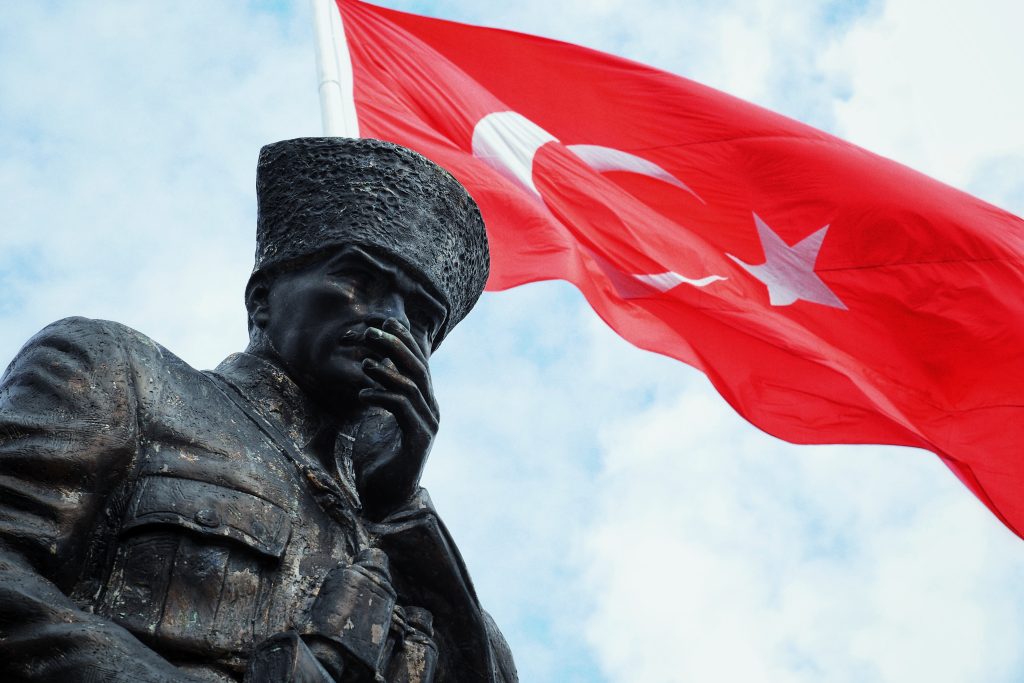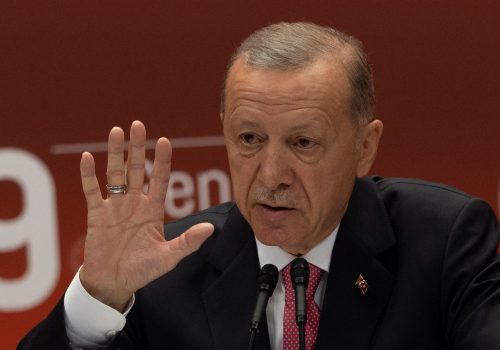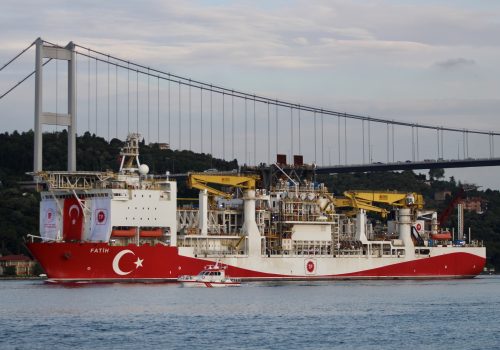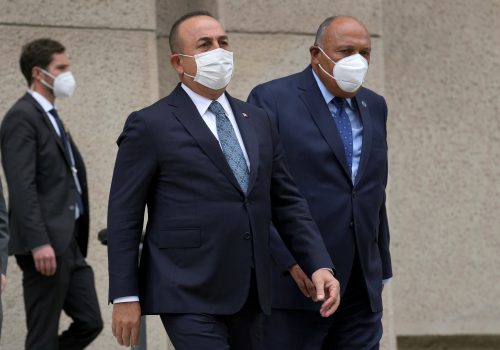In the mid-nineteenth century, Russian Tsar Nicholas I called the Ottoman Empire the “sick man of Europe.” After a centuries-long decline, the empire officially crumbled in 1922. Yet from those ashes, the Turkish Republic arose; and over just a century, it has established a different trajectory.
Turkey has evolved from a small, rump state trying to consolidate its regime, economy, and army, into a rising middle power and important regional and global player. The country is now the home of NATO’s second-largest army and the world’s nineteenth-largest economy; it is also the world’s twelfth-largest arms exporter, the twelfth-largest country by manufacturing output, and the host of more refugees than any other country. While it sits at the forefront of many of the world’s most pressing issues, Turkey has at the same time come under heavy criticism from Western countries, based on their notion that Turkey is abandoning secular democracy for sectarian authoritarianism and on Turkey’s adoption of an autonomous and assertive foreign policy, which has been branded as Neo-Ottomanism.
Today, Turkey is one of the rising middle powers pursuing an independent path. Its moves on the global stage—especially in the military domain—demonstrate that the balance of global power is determined by much more than great power competition. Those moves are a reminder for the West that developing countries are shaping and will continue to influence the course of international relations.
A different trajectory, but persisting tensions
Turkey was founded one hundred years ago on the ruins of the six-hundred-year-old Ottoman Empire, which once stretched across the Balkans, Anatolia, the Gulf, and North Africa. After managing to keep Anatolia and some of Thrace in its war for independence, the young republic was quite introverted. This was translated in the words of the republic’s founding father, Mustafa Kemal Atatürk: “Peace at home, peace in the world.”
Over the course of its first few decades, Turkey adopted a foreign policy of neutrality in major confrontations and entered into peace and friendship treaties with its neighbors. Ankara prioritized creating a nation-state within internationally recognized frontiers and modernizing its state and population as a continuation of the Ottoman Empire’s modernization efforts in the nineteenth century. It also looked to break away from its Ottoman past with reforms that set out to completely transform the society and the state by installing a set of codes through which the Muslim Turks identified themselves—and through which the West perceived them.
Despite having conducted democratic elections—and despite having had a multi-party system since 1946—Turkey’s democratic progress has been threatened or all-out disrupted by coups and military memorandums, including a “postmodern” coup in 1997 and a failed coup attempt in 2016 that was led by FETÖ, the group associated with cleric Fethullah Gülen. Turkish society is polarized today, split based on whether they support or oppose Turkish President Recep Tayyip Erdoğan.
Turkey’s transition from a parliamentary democracy to a presidential system in 2018 has been perceived in the West as a death warrant for Turkish democracy. While needing improvements, Turkish elections remain democratic and competitive. Obviously, a country’s democratic health is more than its electoral democracy; but looking beyond elections, Turkey continues to suffer from the ramifications of insufficient progress in boosting rights for women and religious, ethnic, and social minority groups.
An expanding sphere of influence and independent foreign policy
Turkey underwent a foreign-policy transformation after the Justice and Development Party’s (AKP) rise to power in 2002, turning attention more deeply toward non-Western countries in the Middle East, the Balkans, Central Asia, and Africa.
While before the AKP era, there were leaders who supported Turkey taking on a role as a bridge between the West and Islamic civilizations and supported Turkey adopting an assertive foreign policy and close relations with the Middle East, the application and extension of these ideas happened under AKP rule.
The Balkan countries have historically been important for Turkey’s national security, fueling Turkey’s engagement in the region even before the AKP era. For example, Turkey supported fragile Balkan countries (such as Bosnia and Herzegovina, Albania, and Kosovo) following the end of the Cold War and the breakup of Yugoslavia. But later, Turkey was among the first countries to recognize the independence of Kosovo, was involved in mediation efforts in Bosnia and Herzegovina, and initiated trilateral talks with Bosnia and Herzegovina and Serbia in 2009 and Bosnia and Herzegovina and Croatia in 2010. It also supported peacekeeping missions in the region. AKP foreign-policy leaders strongly supported Western Balkan countries’ integration into NATO and intensified economic relations while encouraging Turkish investments in the region.
Regarding Turkey’s relationship with Central Asian countries, the Organization of Turkic States (previously called the Turkic Council) formalized those relationships when it was established in 2009, bringing together Azerbaijan, Kazakhstan, Kyrgyzstan, Turkey, and Uzbekistan as members and Hungary, Turkmenistan, and the Turkish Cypriot community as observers.
In the first decade of AKP rule, party leaders pursued a soft-power-based foreign policy, putting emphasis on creating relationships with other countries based on shared history, cultural resemblances, and economic exchanges. Historical and cultural ties made clear that it was particularly important for Turkey to play a central role in the Middle East. After the Arab Spring and the start of the Syrian civil war, Turkey shifted to a more assertive foreign policy to respond to increasing threats in the immediate neighborhood, with Turkey starting to use hard power and its military beyond its borders.
Over the past decade, Turkey struck deals with Somalia, Libya, Ethiopia, Niger, and Togo for jointly training troops and developing military programs. In Syria, Turkish armed forces trained and supported opposition groups in the northwest, helping to centralize them into the Syrian National Army (SNA). To prevent the establishment of an autonomous Syrian Kurdish state on its borders, Turkish troops, together with the SNA, held several military operations against the Kurdistan Workers’ Party (PKK)—labeled a terrorist organization by the United States and the European Union—and its Syrian offshoot, the People’s Defense Units (YPG). As a result of these operations, areas overseen by the Syrian Interim Government are now assisted by the Turkey-backed SNA through an array of different bases and posts.
Additionally, Turkey sent its troops to and supported other groups in military operations in Libya, helping the internationally recognized government in its struggle against strongman Khalifa Belqasim Haftar. Ankara also sent drones to and advised Azeri military personnel in operational planning and command to back them in their fight against Armenia in the second Nagorno-Karabakh war; Turkey and Azerbaijan also held more than twenty joint military exercises in 2022. Following the Russian invasion of Ukraine in February 2022, Turkish drones helped Ukrainian forces keep Kyiv while the West was still proposing assistance to Ukraine to evacuate the city. Turkey has also been continuing operations in northern Iraq against PKK/YPG targets and Iran-supported groups.
Currently, Turkey’s power projection outside its borders can also be seen in its growing number of military posts and bases. Since 1974, Turkey has maintained a Cyprus Turkish Peace Command with more than forty thousand troops in the north. There are around forty different Turkish posts on the Turkey-Iraq and Iran-Iraq borders in the Kurdistan Region of Iraq. In 2015, Turkey announced that it would be opening its first base abroad (in Qatar); yet the biggest Turkish military base is one in Somalia (built in 2017), where Turkish armed forces train Somali armed forces and are currently structuring them with the hopes of reconstituting the army.
In addition, Turkey has also contributed peacekeeping troops and established a military presence as part of programs with the United Nations, European Union, and NATO. This is the case in the Balkans (Albania, Kosovo, and Bosnia and Herzegovina), in Lebanon, in African countries (South Sudan, Sudan, the Democratic Republic of Congo, the Central African Republic, Mali, and Somalia), and in Afghanistan.
Turkey’s broader foreign policy—from its efforts to increase its diplomatic agency to its striving for energy independence—has also played a role in helping the country evolve from a small state and into a rising middle power. For example, by ramping up arms production (especially of unmanned aerial vehicles) Turkey carved out for itself a role as a key player in arms exports and, therefore, the global defense ecosystem writ large. Turkey’s rise to middle-power status can also be seen in its eagerness to play a leading role in mediation efforts among conflicting parties, such as with the Black Sea Grain Initiative, and its worldwide humanitarian diplomacy efforts, best illustrated by the high level of humanitarian aid it gives (it is the top donor country globally, when considering the aid in relation to gross domestic product) and the number of refugees it hosts (more than any other country).
On Turkey’s one-hundredth anniversary, the West would be wise to recognize how Turkey has become a frontrunner in a group of middle powers that is “increasingly influential, self-confident, and independent.” If the West is to contend with this new era, in which middle powers have increased influence on the global stage, it must consider the needs and concerns of these countries—and especially the wants and priorities of such a close partner and NATO ally as Turkey.
Pınar Dost is a nonresident fellow at Atlantic Council IN TURKEY and a historian of international relations. She is also the former deputy director of Atlantic Council IN TURKEY. She is an associated researcher with the French Institute for Anatolian Studies and the author of Le bon dictateur: L’image de Mustafa Kemal Atatürk en France (1939-1938) (Libra, 2014). Follow her on X (formerly known as Twitter): @pdosting.
Further reading
Tue, May 30, 2023
Five more years for Erdogan. What’s first on his agenda?
New Atlanticist By
Turkish President Recep Tayyip Erdoğan just won another five-year term in office. Atlantic Council experts share their insights on the pressing issues his administration faces.
Wed, Dec 7, 2022
Turkey can become an energy hub—but not by going all-in on Russian gas
TURKEYSource By Yevgeniya Gaber
Turkey has the ambition and potential to play a key role in the regional energy landscape but Russian gas hampers its effort to become a hub.
Tue, Oct 12, 2021
Turkey has flipped the script on its regional isolation. But will it amount to real change?
TURKEYSource By
Over the past year, Turkey has launched efforts to normalize its strained relations with several states in the Middle East. While the countries have successfully managed to de-escalate tensions, doubts remain as to how far the efforts will lead.



